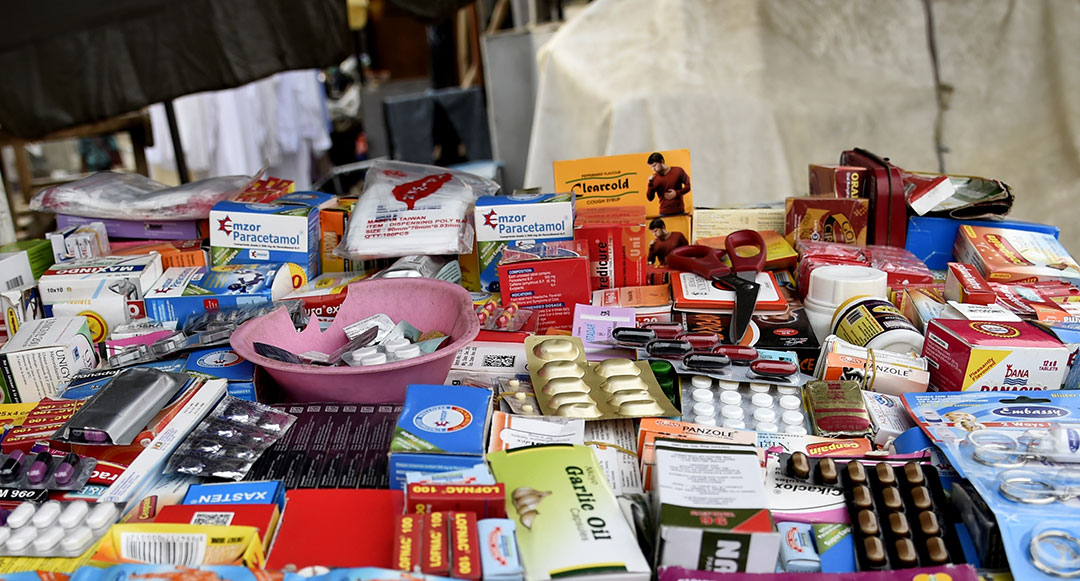Nations Team Up to Interrupt Flow of Fake Drugs
ADF STAFF
Fake medicines — materials posing as authentic pharmaceuticals but containing anything from industrial solvents to plain water — have long plagued the countries of Africa.
The World Health Organization (WHO) estimates that African nations account for 42% percent of all counterfeit medicines in circulation. The results can be deadly.
In Nigeria in 2009, a counterfeit batch of My Pikin teething syrup laced with a chemical found in brake fluid killed 84 children. In Cameroon in 2019, fake hypertension drugs contained glibenclamide, an anti-diabetic medication, instead of the correct compound to treat high blood pressure. That same year, a fake meningitis vaccine circulated in Niger during a campaign to immunize children.
Across Africa, at least 27 countries have reported fake or substandard medical products, according to WHO, which estimates nearly 170,000 African children die from pneumonia every year when they take fake antibiotics. Fake malaria drugs claim nearly 160,000 lives in Sub-Saharan Africa.
The problem is so profound in Nigeria that in 2017 the country’s National Agency for Food and Drugs Administration and Control raided street markets and called upon the public to report people producing illegal drugs.
Africa’s rapidly growing pharmaceutical market, estimated to be worth $45 billion, makes it ripe for fakes and counterfeits, many of them from China or India, according to WHO. Counterfeiters benefit from the fact that authentic drugs often are expensive and hard to get, prompting poor and rural residents to look for cheaper options.
The outbreak of COVID-19 gave scammers the opportunity to pitch fake cures for the disease. At the same time, tight government budgets have less money to enforce regulations that ensure pharmaceuticals are safe.
Interpol’s Operation Pangea found 2,000 online resources advertising counterfeit “corona spray,” masks and other supposed treatments for COVID-19.
Private companies have risen to the challenge of verifying that drugs are safe and effective. Uthabiti Health tracks drugs through a process that adds an identifier to each package, letting the company trace their movement through the supply chain.
“Pharmaceutical science is the center of health care; one mistake in any drug composition or formulation has the risk of endangering a significant number of people,” Towett Ngetich, CEO of Uthabiti Health, a Kenya-based pharmaceutical company, told Forbes Africa. “The need to access safe, affordable and quality health products in its simplest form means life and death in diagnosed health complications.”
In Nigeria, Vivian Nwakah founded Medsaf in 2017 to help health care facilities buy authentic drugs. The company verifies drugmakers before listing their medications on its site. Nwakah said she was inspired to create Medsaf by the death of a friend who took a fake malaria medication.
“That alerted me to this world that Nigerians are actually just resigned to the fact that they may or may not get a real medication when they go to the pharmacy or the hospital,” Nwakah told Business Day. “It’s not fair that Africans are OK with potentially not having access to the medications they need to save their life. Someone needs to stand up for that.”
Governments expanded their efforts to block fake drugs in 2020.
In January, Senegal, The Gambia, Ghana, Niger, Republic of the Congo, Togo and Uganda signed the Lomé Initiative criminalizing the trafficking of illegal medications. That same month, officials destroyed more than 7 tons of fake drugs in Libreville, Gabon. A month later, Burkina Faso caught 3 tons of fake drugs.
More often than not, however, financially strained national governments find themselves on the losing side of the fight.
“The fight against trafficking in fake medicines is an asymmetrical battle,” Dr. Barira Dan Nouhou, director of Pharmacy and Traditional Medicine in Niger told Africa Report. We are working hard, with limited human resources, in the face of a highly organized traffic.”


Comments are closed.